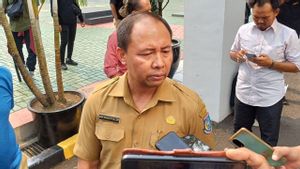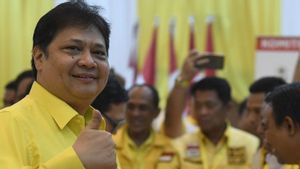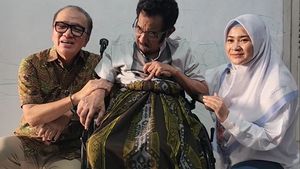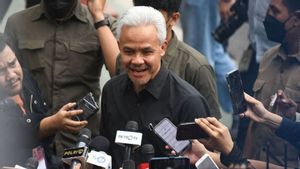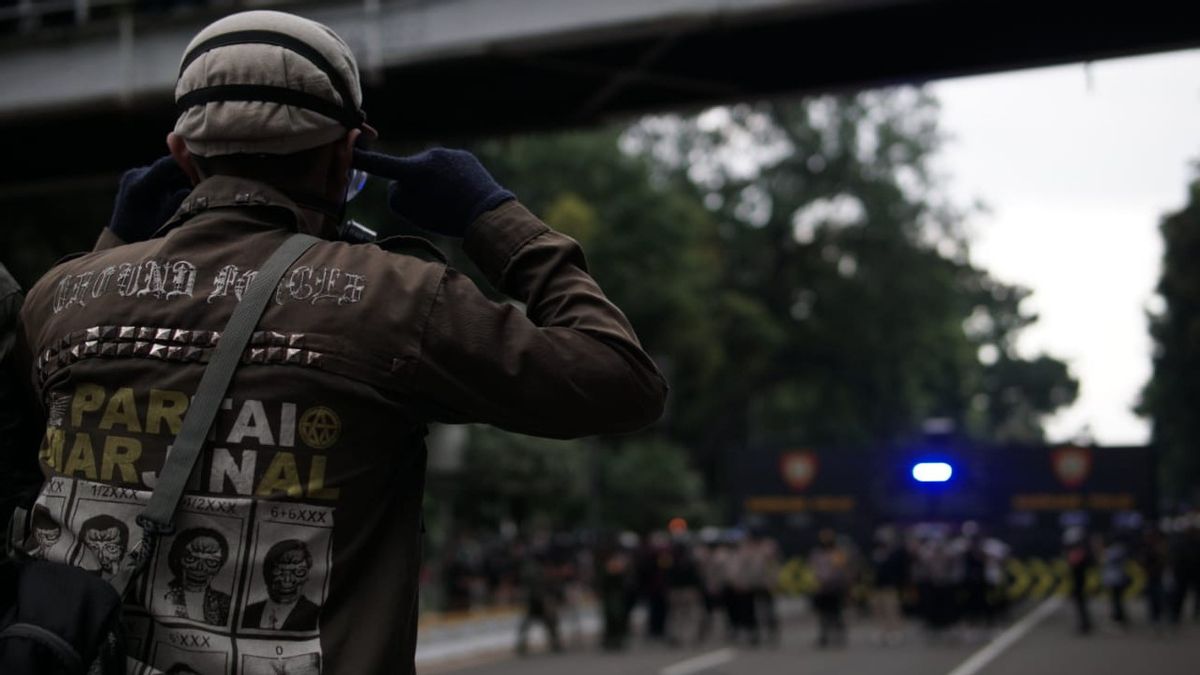
JAKARTA - Demonstrations against the Omnibus Law on the Job Creation Law continue. The dominant mass of workers and students who wanted to meet President Joko Widodo (Jokowi) at the State Palace in Jakarta failed. Jokowi is at the Bogor Palace, with an agenda to meet Japanese Prime Minister (PM) Yoshihide Suga tonight. The public has linked this incident to the historical events of Malapetaka January 15 (Malari) in 1974. Why Malari? What was it like? What are the similarities?
The Indonesian Student Executive Board (BEM SI) insinuated Jokowi in a speech at the Arjuna Wiwaha Horse Statue area, Jalan Medan Merdeka Barat, Central Jakarta. "We want to meet with Jokowi to issue a Perppu. But, the President is in Bogor, my friends," said the orator, Alif, in a loud voice, Tuesday, October 20.
At the Bogor Palace, Jokowi will meet Japanese Prime Minister Yoshihide Suga. Japanese Foreign Minister Motegi Toshimitsu and Indonesian Foreign Minister Retno Marsudi agreed that this meeting was important to achieve strategic goals related to bilateral relations between the two countries.
"Foreign Minister Motegi hopes that the Prime Minister's visit will be meaningful so that bilateral relations (with Indonesia), which is a strategic partner, will strengthen," said the Japanese Embassy in Jakarta, in a written statement received on Tuesday, October 20.
Indonesia looks important. Suga has just been appointed as a replacement for Shinzo Abe, who recently resigned from the position of prime minister due to illness. And Suga chose Indonesia and Vietnam in his first bilateral visit as leaders of Japan.
Malari 1974At the Jakarta Palace, the crowd pressed for a meeting with Jokowi. At the Bogor Palace, Jokowi warmly welcomed Japanese PM Yoshihide Suga https://t.co/L7Eiv42qIJ
- voi.id (@voidotid) October 20, 2020
January 15, 1974, thousands of students from various campuses in Jakarta took to the streets to protest against the economic policies of the Soeharto Government which were considered too passionate about foreign investment. The mass action was carried out at the same time as the arrival of Japanese Prime Minister Kakuei Tanaka who was about to meet Suharto.
This action became the first mass protest in the Suharto era. This action also tarnished the face of the Soeharto government in front of its own special guests.
As Widiarsi Agustina wrote in the Mysterious Masses of Malari: The First Political Unrest in the History of the New Order (2014), the demonstration started with the University of Indonesia Student Council led by Hariman Siregar who took to the streets. Their first destination at that time was Halim Perdanakusuma Airport, where Tanaka landed.
At the same time, another group called the Islamic Education Reform Movement (GUPPI) mass, pedicab drivers, and Kramat thugs at the orders of Ali Moertopo's leadership moved towards the Senen Market. "Riot exploded here," wrote Agustina.
The riot then spread to a number of places, such as Jalan Juanda, Jalan Gajah Mada, Jalan Hayam Wuruk, and to the Kota area. The action, which was initially peaceful, turned violent. The mass of buildings and motor vehicles, especially those produced by Japan, were swamped.

The mass action also caused fires at several points. The fire burned from noon to midnight. This riot burned 144 buildings, 807 cars and 187 motorbikes. Meanwhile, eleven people died, 17 were seriously injured, and 120 people were slightly injured.
At that time, Suharto was indeed opening the door for investment. At the beginning of his reign, Suharto tried to make improvements in various aspects of the state, one of which was to pay off debts inherited from the Old Order.
One of Suharto's policies to pay off debts was through foreign investment. At that time, the United States (US) was Indonesia's big partner, especially in the energy and mining sectors. However, the dominance of Japan in Asia, especially Indonesia at that time was more visible.
Various kinds of products, ranging from transportation, electronics and consumer goods are dominated by Japan products. This led to the outbreak of the Malari incident, although recently there were allegations that the action was infiltrated by elite interests. Malari was also said to be the enemy field of the two Commander-in-Chief of the Operation Command for Restoring Security and Order (Kopkamtib) General Soemitro and Suharto's Personal Assistant Ali Moertopo.
PM Suga's visitAs stated by Japanese Foreign Minister Motegi Toshimitsu and Indonesian Foreign Minister Retno Marsudi, this meeting is important for the strategic relationship between the two countries. What relationship is meant?
Professor of International Law at the University of Indonesia (UI) Hikmahanto Juwana mentioned at least four meanings in Suga's visit to the Bogor Palace, most of which were related to investment and the economy. Hikmahanto said: First, Japan wants to emphasize to Indonesia that Indonesia's existence is very important in the eyes of Japan.
In the above context, Japan wants to emphasize their position in the development of Indonesia which is currently incessant. "In this context, Indonesia does not need to rely only on one country, namely China with its economic and technological strength," Hikmahanto, told VOI, Tuesday, October 20.

The second meaning is that Japan wants to strengthen strategic partnerships, especially related to international shipping routes, given that Japan is currently experiencing interference from China. We remember that many countries - such as the US, Australia and Japan - are worried that China's military and economic power will dominate the South China Sea, an important route for international shipping.
"In this context, Japan will all out to help Indonesia so that China does not assert the unilateral claim of the nine broken lines by utilizing fishermen and their coastguard ships to dispel Indonesian fishermen," said Hikmahanto.
Third, Japan wants to call attention to Indonesia that Japanese companies and technology are superior and reliable than Chinese companies and technology. Therefore, returning to the point of development, Indonesia has an alternative in choosing companies and technology: Japan.
The fourth point, Hikmahanto said that Japan wanted to invite Indonesia to continue to develop growth in the Indo-Pacific region. Japan hopes that the region can develop economic growth with African countries, where Indonesia is currently aggressively making stronger relations with the countries of the Black Continent.
"In this context Japan will support Indonesia, even if Indonesia invites ASEAN in developing relations with various countries in Africa."
There is no denying the importance of economic development. Nobody expected chaos, let alone bloodshed. So, remembering history is always important. Especially in today's conditions. The sensitivity of the leaders of the country to the interests of the people is a fixed price.
Soeharto, those days are so stupid. Arief Budiman, in Freedom, State, Development: A collection of writings from 1965 to 2005 which we quoted from Historia.id wrote: With the Malari Incident, Soeharto seems to have taken a firm stance: Go to hell with civil society. He seemed to remind the scholars / students who is the boss.
And another reason it is important to look at history is to remember what the father of modern sociology, Karl Marx, said. This quote is also included in the first paragraph of the article Malapetaka Politik Pertama (Disaster Political Disaster), quoting what Dhaniel Dhakidae conveyed during the 40th anniversary of the Malari incident on January 15, 2004. A quote that we cannot possibly miss.
"The repetition of history is a joke at the first time and will be a tragedy in the second," the scholar quotes Karl Marx: History repeats itself first as tragedy then as farce.
The English, Chinese, Japanese, Arabic, and French versions are automatically generated by the AI. So there may still be inaccuracies in translating, please always see Indonesian as our main language. (system supported by DigitalSiber.id)




